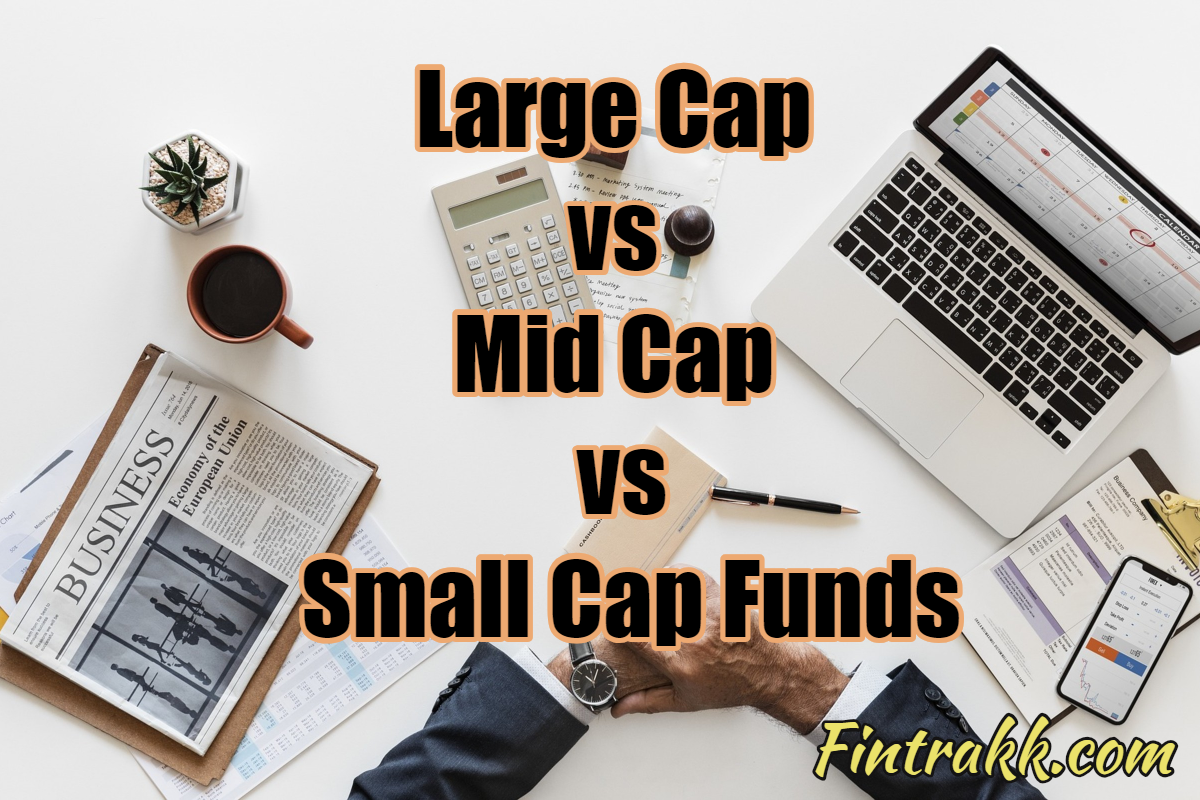If you are confused amongst Large Cap vs Mid Cap vs Small cap funds, then this post will help you with the difference between performance and general review of Large, mid and small cap funds.
Companies around the world listed in stock exchange are categorised according to market capitalisation. Publicly traded companies are divided into different categories of market cap: Large cap, Mid-cap, and Small-cap. It helps to establish the first base on evaluating the company’s performance and financials. A company is not evaluated by its share price.
Suppose, a company’s stock is trading at Rs. 100 and it has 10000 outstanding shares. Its market cap will be Rs 10 lakhs and another company with a share price of Rs. 60 and 50000 shares outstanding will have a market cap of Rs 30 lakhs. Here the company with a share price of Rs. 60 is more valuable.
Classification of Market Capitalisation in India:
- Large Cap: Stocks with Market cap of Rs. 20,000 crore or more
- Mid-cap: Stocks with market cap range of Rs 5 crore and 10 crore
- Small Cap: Stocks with a market cap less than Rs. 5 crores.
Large Cap, Mid Cap and Small Cap Mutual Funds:
 Mutual Funds also offer it investors with different schemes under the categorization of large, mid and small-cap funds. It helps the investors to invest in a bouquet of stocks at once with greater diversification and efficient price discovery of investment.
Mutual Funds also offer it investors with different schemes under the categorization of large, mid and small-cap funds. It helps the investors to invest in a bouquet of stocks at once with greater diversification and efficient price discovery of investment.
In mutual funds, it depends on the fund house/ fund manager how they differentiate between different category. They use different valuations for measuring market cap for a different category.
For example: Birla Sl defines mid-cap stocks between Rs 150 crore and Rs 1,500 crore of market capitalisation and DBS Chola defines the range between Rs 300 crore and Rs 3,000 crore.
Large Cap Funds:
The fund invests its corpus in companies with large market capitalization. Companies with large market capitalization are often described as reputable and strong players in their field of business. Their proven business model, tried and tested for many years helps them to gain the maximum confidence of shareholders.
The companies with large market caps are considered compounders of wealth over a long time period and are regular on dividend payment. They deliver a steady return on investment on relatively lower risk compared to midcap funds and smallcap funds. Investors with a longer time view with less risk in equity can consider the fund.
You may also like: Top 10 Companies in India by Market Cap
Midcap Funds:
The fund invests in mid-sized companies with a market cap which lies between large caps and small cap companies. Mid-cap fund or companies are considered as developing companies with established business. Midcap mutual funds are considered riskier than large-cap funds. During the volatile phase in the market, mid-sized companies loose maximum value than large caps and during the bull phase, these companies outperform many large cap stocks.
The funds are diversified across sectors with the prudent stock selection, market timing by fund managers helps in better risk management and returns from the fund.
SmallCap Funds:
Investment in small cap funds possess a high risk of volatility and are most vulnerable to business and economic downturn. The fund invests in small cap companies which have the good business model and high growth potential. Small cap funds have huge potential for upside movement. The fund is suitable for investors seeking higher returns and has high risk taking appetite.
Mutual Funds: Investment Approach and Performance
Investment in equity funds with the different market cap of funds is suitable for longer term investment period, as we can check the table below. There is no difference in the strategy adopted by the fund manager for investment in different caps of funds. Investors need to check for the risk associated with investment and one can check with the standard deviation of the fund.
The standard deviation of a fund measures this risk by measuring the degree of fluctuation in average return over a period of time. High standard deviation denotes high volatility.
We can check the returns from large cap fund index VS small & midcap index over different period of time from table below.

As we can see, that the small and midcap index has performed better than the large cap index, the mid and small cap funds would seem like better options. However, the bigger the risk, more the reward, holds true for this case as well. One must be thoroughly prepared for higher risk while investing in mid and small cap funds.
Large Cap vs vs Mid Cap vs Small Cap Funds: Summary
Investment in mutual funds are subject to market risk, but risk can be taken care of by making an informed decision on which type of fund to invest in. An investor in equity fund should invest in type of the fund according to his/her risk appetite and investment objective as it will help the investor to realise his/her financial goals more efficiently.
Disclaimer: This post is not a financial advice in any regard. Please consult your financial adviser before taking any investment decision. Fintrakk.com or any of its representatives are not responsible for any loss that might happen due to your investments. Kindly follow due diligence and be cautious while investing your money in risky asset classes.



It seems you have done great research on different types of mutual funds. Keep it up 🙂 Nice information for the ones looking to invest their money in mutual funds.
Thanks for your appreciation 🙂 Keep visiting to see our latest posts.